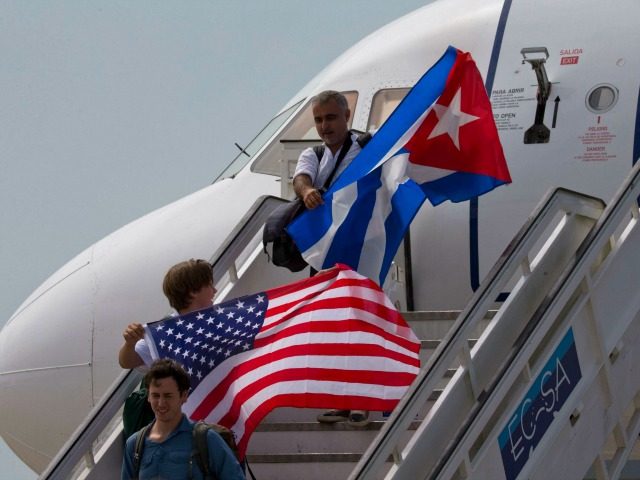The State Department announced Wednesday it has begun the process of considering allowing U.S. citizens to sue the government of Cuba for property stolen in the mass “nationalization” theft shortly following the Cuban Revolution.
U.S. citizens possess this right under the Cuban Liberty and Democratic Solidarity (LIBERTAD) Act of 1996, commonly referred to as the Helms-Burton Act. The law also allows American citizens to sue any foreign corporation that conducts business in the United States for profits they have made in using stolen property, threatening corporations like Carnival Cruises, which inked a deal during the Obama era to use stolen ports in Havana and Santiago de Cuba. Individuals who were not American citizens at the time of the Revolution may also use the law to bring cases to U.S. courts.
No Americans have been allowed to exercise the rights provided by this law because the State Department has suspended it every six months for the past 23 years. In a press release Wednesday, Pompeo suggests the Trump administration may end this limitation.
Pompeo suspended the law for 41 days beginning on February 1, an unprecedented move.
“This extension will permit us to conduct a careful review of the right to bring action under Title III in light of the national interests of the United States and efforts to expedite a transition to democracy in Cuba,” the State Department notes in its release.
The agency also noted that allowing justice for American citizens who were victims of Cuban government theft has become an international issue because of “the Cuban regime’s brutal oppression of human rights and fundamental freedoms and its indefensible support for increasingly authoritarian and corrupt regimes in Venezuela and Nicaragua.”
“We call upon the international community to strengthen efforts to hold the Cuban government accountable for 60 years of repression of its people,” the statement concludes. “We encourage any person doing business in Cuba to reconsider whether they are trafficking in confiscated property and abetting this dictatorship.”
The State Department made this determination two months after a report surfaced suggesting that Pompeo had begun considering allowing these lawsuits. News service McClatchy reported that prior to National Security Advisor John Bolton’s announcement of further sanctions that month on Cuba, Venezuela, and Nicaragua, the State Department had begun considering the unprecedented move of allowing the victims of the Revolution to exercise their rights as provided by the law.
Cuba has an estimated eight billion dollars to lose if forced to pay for the property stolen from Americans and Cuban refugees during the Revolution, largely consisting of ports, farmlands, and privately owned businesses. The U.S. has reportedly documented the existence of at least 6,000 larceny claims against the Castro regime.
The Cuban regime reacted aggressively to the State Department’s announcement.
“Cuba rejects this threat in the most energetic, firm, and categorical way,” the Ministry of Foreign Relations (Minrex) states in an official statement published in Granma, the official newspaper of the Communist Party. “It [Cuba] interprets this as a hostile act of extreme arrogance and irresponsibility, while repudiating the disrespectful and calumnious language of the State Department’s press release.”
Minrex also claims that the Helms-Burton Law is a violation of international human rights norms and argued that, rather than the Castro regime owing Americans for their theft, America somehow owes Cuba hundreds of billions of dollars for “human damages.”
If the State Department stopped blocking the law, according to Minrex, “any Cuban and any community in the country will see … demands for the residences they live in, the workplaces where they labor, the schools their children attend, the clinics they receive treatment from … and an attempt to usurp the riches of the country from the hands of Cubans.”
That argument presumes that Cubans, under a communist government, have the right of property ownership, which they, by and large, do not. Many of the properties the Cuban Revolution stole from Cuban and American citizens still remain under Castro regime control, particularly the more lucrative ones, such as ports and farms. Buildings like the former Havana Hilton, now the Hotel Tryp Habana Libre, spent less than a year under proper ownership before their theft and now operate to raise funds for the Castro regime. The Habana Libre is currently owned by a Spanish corporation “in association with the Cuban government.”

COMMENTS
Please let us know if you're having issues with commenting.